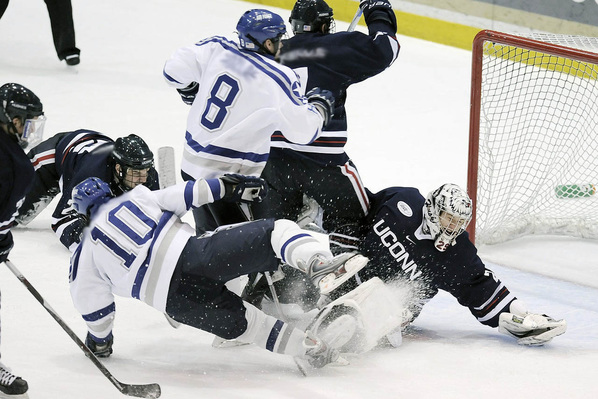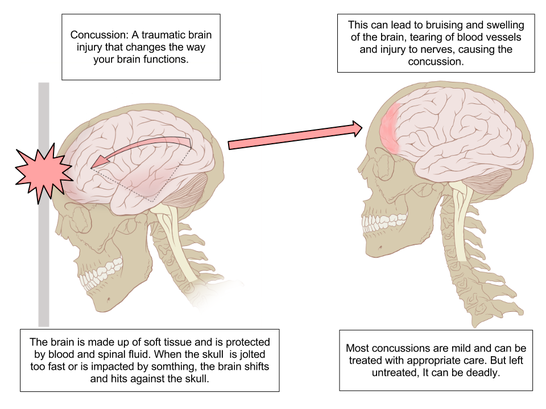|
In 2007, Tom Shadyac was in a bicycle accident that dramatically changed his life. He was at the time a successful comedian and film director making comedic films such as The Nutty Professor and Bruce Almighty. After the accident he suffered post-concussion syndrome and had headaches, hyper-sensitivity to light and noise, and chronic tinnitus that eventually led to suicidal thoughts. All Western medical treatments failed to help and he began to give away his mass fortune and sold his mansion in LA then he moved into a deluxe but simple trailer park in Malibu in order to reorient and simplify his life. He isolated himself completely, sleeping in his closet with black out curtains on the windows of his mobile home. This life threatening experience prompted him to ask, "What is wrong with our world and what can we do about it?," and he made an amazing documentary around these questions called "I AM" in 2011. Symptoms of a concussion Concussion or Traumatic Brain Injury can alter the way the brain functions. The effects may be temporary and include what are considered as milder symptoms such as short attention span, slowed thinking, reduced ability to learn and process information, headaches, fatigue, sleep disturbances, impatience, frustration, confusion, poor judgement, depression, mood swings, blurred vision and vomiting. There is often a loss of consciousness when the trauma occurs but it is not always the case, and therefore a person is often not aware they have had a concussion. When there is a severe head injury, there is a greater risk to the brain and the symptoms can also include unconsciousness, fits or seizures, difficulty speaking or staying awake, vomiting, blood or clear fluid coming from the ears or nose, memory loss, swelling and bruising around the eyes or behind the ears, difficulty walking and possibly death. We now know that previous head injuries can seriously aggravate a current head injury and this is something that professional athletes and active people are aware of. However, as was Tom's case, there is no recognized medical treatment for concussion other than rest, medications for headache, and ongoing observation that the patient's condition does not get worse, or in the most extreme case a surgical procedure may be suggested. What people don't always know is that homeopathy has many remedies for concussion and trauma to the brain. How we know we can use homeopathy In 2009, an article was published in the Journal of Head Trauma Rehabilitation on a study of the homeopathic treatment for mild traumatic brain injury. The study showed a significant improvement in those taking remedies over the control group not receiving homeopathy. They saw improvement in their ability to understand technical or work-related information, follow instructions, read newspapers or novels, do housework, and socialize in small or large groups. Some of these participants who were unable to work for years returned to work. The past 200 years of clinical cases of brain injury cases also support that homeopathy can help recovery and healing of mild and serious concussion and post-concussion syndromes. The fascinating fact is that homeopathy can be helpful in current situations but also in previous and long standing symptoms due to head injury. What this means it that we can resolve the symptoms of a recent injury as well as resolving ongoing symptoms of previous injuries, and that means a future head injury might be less traumatic or life threatening for those at greater risk such as hockey players or avid mountain bikers. It is important to remember the Three Branches of Western medicine making sure that standard medical care is sought out in the event of any kind of serious head injury. However, using homeopathic remedies as well can speed up the recovery and improve the outcome. As with any kind of trauma, the person can at first be in a state of shock. This state makes it difficult for them to think clearly and responsibly. They may underemphasis the severity of the injury and attempt to forego any medical treatment. This can have terrible consequences later on. Maybe they just have headaches and difficulty sleeping, but some people can undergo extreme changes to their mood and may develop depression and even suicidal thoughts which were never present before the injury. There are several remedies depending on the situation that can be self-administered after a head trauma or given to the person who was injured. Arnica: This is the go to remedy to take immediately or as soon as possible after any serious head injury. Arnica addresses the shock and also works to reduce, stop and even reverse damage from bleeding, swelling and the effects of blunt trauma. The effects are rapid and powerful and can reduce the severity of the trauma and future complications. In a severe case, it is ok to take a high potency 1M arnica in moderation. For the lower potencies it would be ok to redose more often at first to keep the bleeding and swelling in check depending on the severity of the injury. If the person says they are fine and they don't need any help, encourage them to take the arnica as a preventative measure. Hypericum perforatum: This remedy is good to add when there is trauma of the nervous system after head, neck or spinal injuries. Symptoms following the trauma such as stiff neck, whiplash, pinched nerves, can all benefit from hypericum. Feelings of numbness, tingling, burning and neuralgic pains that shoot out suggest damage to the nerves and nervous system. Spasms and seizures can also indicate the use of this remedy. Helleborus niger: After the injury the person seems very slow to respond to questions and slow in talking, and there is a noticeable delay in their cognitive function. They may have a blank facial expression and lack any range in emotional responses. They have trouble thinking, concentrating and remembering things. There may be chronic headaches and they appear slow, passive and seem to be depressed, indifferent and apathetic. Natrum sulphuricum: This is a well known remedy if the post-injury symptoms are long standing. It is also a good remedy when the person become depressed, has shifts in mood and personality, such as becoming more irritable and confused, and even thoughts of suicide. There may also be chronic headaches and new symptoms of asthma. Belladonna: If there is a lot of heat, redness, throbbing, and fullness in the head after an injury. The may become delirious or frantic, and in this state may even bite or strike at those around them. Cicuta: If there are seizures after a head injury or if the head injury is severe and there seems to be mental retardation, consider this remedy. The suggestions in this list are for self-care and first aid use. The remedies provided do not represent a complete list of available remedies but are trusted choices for the states described. Remember to take remedies only as they are needed, and that taking them as seldom as possible is the best approach. Usually a 30ch or lower potency number is best for this kind of self-administered remedy selection. If you find you are taking any remedy more and more often for the same reasons it might be time to consider a consultation with a homeopath to find the deeper causation and get you to a healthier state. It is of course ideal in the case of a severe concussion for the medical team to work closely with a professional homeopath for the best possible outcome. ~ How does holistic treatment support healthy living? Why try homeopathy? Having a life long study in the principles of nature and healthy living, Lauren Trimble is happy to share her knowledge and experience. The art of retuning the body’s natural healing capacity & developing consciousness in a compassionate and gentle way is the gift that homeopathy brings to her current holistic practice. If you enjoyed this article find out more at Birdsong.
0 Comments
Your comment will be posted after it is approved.
Leave a Reply. |
Lauren TrimbleHomeopath and Holistic Practitioner. Archives
October 2022
|



